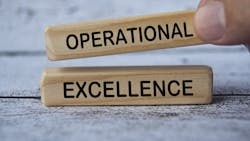Developing Problem Solvers for Operational Excellence
GE Healthcare’s Sarah Tilkens doesn’t have a background in manufacturing. What she does have is a curious, questioning nature.
“I’m an experimenter,” says the senior manager of operational excellence in the manufacturer’s imaging operations. “I'm always looking to test something, and when I learned lean, it essentially gave me a language for everything. It’s what I've been trying to do my whole life. I just didn't know that you could put terminology to it.”
Tilkens’ words give a hint at her background in science. A self-described lifelong learner, Tilkens joined GE Healthcare about five-and-a-half years ago as a lean leader. Her credentials, however, include a stint as a biologist doing biomedical research. She’s also a Six Sigma Black Belt, a certified coach and, just before joining GE Healthcare, worked in construction project management.
That cumulative experience is brought to bear in Tilkens’ current role. As senior manager of operational excellence, she supports the organization’s strategic initiatives around cost, delivery and efficiency by helping “cultivate and unlock lean talent in service of solving our biggest problems.”
Tilkens will present at the IndustryWeek Operations Leadership Summit later this month in a session titled: “Optimizing Talent for Operational Excellence.” We recently spoke with her in advance of that presentation. Here are three takeaways from that conversation.
Brainstorming versus Trystorming
Bonus Content
Hear more about Tilkens' lean leadership philosophy on our May Production Pulse: IW Operations Leadership Summit Updates.
Tilkens introduced a new concept to this IW editor when a conversation about problem solving turned to “trystorming.”
“We learn by doing,” says Tilkens by way of introducing trystorming. If brainstorming is cerebral, trystorming is action oriented.
“Brainstorming is, ‘I'm coming up with all the ideas for my brain,’ and trystorming is, ‘I'm acting.’ So, it's literally a convergence opportunity where I say, ‘OK, we've been brainstorming for long enough. We're not going to solve this in the conference room,” she says. The next step is “doing something about it.”
“You can think about it all day, but go try something because in the trying, you're going to generate feedback on, ‘Am I [going] down the right path?’” Tilkens says. “It’s either going to work and you're going to keep going down that path or it's not. And you're going to get more information to feed back into your brainstorming.”
“We have lots of kaizen events at the site where the intention isn't always on solving the problem, but it's on expanding your ability to think about problem solving.”
Becoming Exceptional
Tilkens says the most rewarding part of her job is “watching people become exceptional in the way that they learn to solve problems.”
“We have a lot of different types of talent,” she says. “I think the way that we offer talent development opportunities, people can really find their ‘special’ and learn how to solve really big problems, but in a way that feels unique to them.”
“They believe in their talents. They’re growing. They’re experimenting. Just watching them transform is hugely rewarding,” she says.
Tilkens says she’s particularly enjoyed participating in a recent pilot program in which union members join her team to learn and develop, “unlocking them as problem solvers,” she explains. The onboarding effort on her team, however, didn’t begin with skills training. “It was, ‘Who are you as a leader?’ ‘What are your superpowers like?’ ‘What do you want to be when you grow up?’ ‘Show me why you're special.’ And I never told them how to serve, I just helped them find a way that they could serve that felt great to them,” she says.
Tilkens says her team has had a lot of success with the pilot. “For me, who’s more of a coach, that is something I’m so proud of.”
Best Practice: Clarity
What best practices are likely to drive better outcomes when it comes to operational excellence? “My recommendations to the world are … get really clear on what problem you're trying to solve,” Tilkens says.
“The best thing you can do in building problem solvers is to get them to understand the thought process,” she says. “Often we fall down because we are implementing solutions before we're clear on the problem that we're trying to solve, the impact that we're trying to have and what success ultimately looks like.”
About the Author
Jill Jusko
Bio: Jill Jusko is executive editor for IndustryWeek. She has been writing about manufacturing operations leadership for more than 20 years. Her coverage spotlights companies that are in pursuit of world-class results in quality, productivity, cost and other benchmarks by implementing the latest continuous improvement and lean/Six-Sigma strategies. Jill also coordinates IndustryWeek’s Best Plants Awards Program, which annually salutes the leading manufacturing facilities in North America.
Have a story idea? Send it to [email protected].


